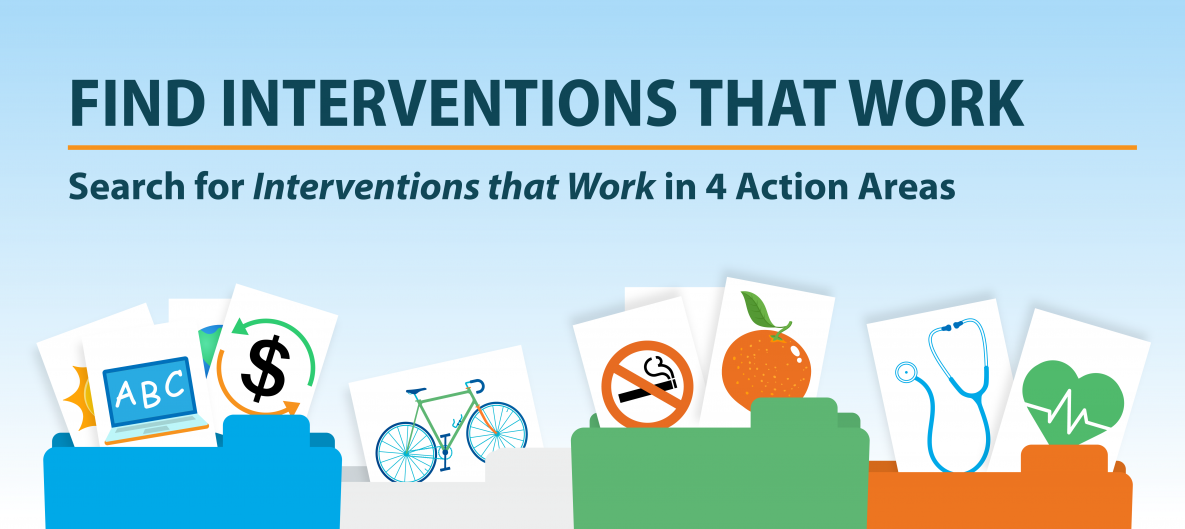Find Interventions that Work

The following links provide evidence-based interventions that can work in the four action areas—socioeconomic factors, physical environment, health behaviors, and clinical care.
- The Community Guide is a collection of evidence-based findings of the Community Preventive Services Task Force (CPSTF). It is a resource to help you select interventions to improve health and prevent disease in your state, community, community organization, business, healthcare organization, or school.
- The S. Preventive Services Task Force is an independent, volunteer panel of national experts in disease prevention and evidence-based medicine. The Task Force works to improve the health of people nationwide by making evidence-based recommendations about clinical preventive services.
- The Cochrane Library, a collection of databases that contain different types of high-quality, independent evidence to inform healthcare decision-making.
- The Campbell Collaboration is an international social science research network that produces high quality, open and policy-relevant evidence syntheses, plain language summaries and policy briefs.
- The County Health Rankings & Roadmaps (CHR&R) is a program of the University of Wisconsin Population Health Institute. The CHR&R program provides data, evidence, guidance, and examples to build awareness of the multiple factors that influence health and support leaders in growing community power to improve health equity. The Rankings are unique in their ability to measure the health of nearly every county in all 50 states, and are complemented by guidance, tools, and resources designed to accelerate community learning and action.
- The 6|18 Initiative connects healthcare purchasers, payers, and providers with CDC researchers, economists, and policy analysts to find ways to improve health and control costs with the 6|18 interventions.
- The Health Impact in 5 Years (HI-5) initiative highlights non-clinical, community-wide approaches that have evidence reporting 1) positive health impacts, 2) results within five years, and 3) cost effectiveness and/or cost savings over the lifetime of the population or earlier.
- Canadian Best Practices Portal – CBPP (phac-aspc.gc.ca) provides evidence-based tools for health professionals and public health decision-makers. The site provides evidence and resources for health promotion and disease prevention programs.
- Washington State Institute for Public Policy (WSIPP) provides results of non-partisan, applied policy research for the Washington state legislature. WSIPP works to conduct studies that answer relevant policy questions.
A Coalition Adopts and Implements Evidence-Based Programs within Their Local Context
Founded in 2010, Healthy Chelsea (formerly The Healthy Chelsea Coalition) works across the city of Chelsea, Massachusetts to build capacity for policy, systems, and environmental changes focusing on healthy eating and active living. Working closely with its backbone organization, The Charlestown Coalition (formerly the Charlestown Substance Abuse Coalition), this Coalition has used the CHI Navigator’s Find Interventions that Work to encourage the adoption and continued implementation of evidence-based programs by local partners. As the Coalition Coordinator explained, “I have colleagues working on Safe Routes to School. The [CHI Navigator] Database gives us that validation that we’re doing the right thing. I can say to my colleagues, ‘Look, you’re [using an approach] on the evidence-based list from CDC!’”. Additionally, the Healthy Chelsea Coalition has shared resources from the CHI Navigator with a variety of audiences including at community forums and with hospital leadership. As a CDC-developed resource, the CHI Navigator “gives credibility” to the Coalition when it is educating partners about what it means to use evidence-based programs and why “it’s important to stick to the program”.
Learn more about Healthy Chelsea, or contact Jennifer Kelly, Director, at 617-887-4219 or jkelly14@partners.org